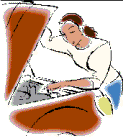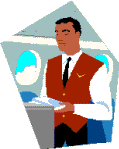February-March
2006  |
How have life skills changed over the years? How much have they changed? As we find ourselves communicating more and more in digital format, can our non-linguistic students "survive?"
Now, more than ever, it is important to teach people how to fish. And what fish are out there? -- Information, resources, training, community, and jobs.
Life skills, as I see it, are those practiced behaviors that allow us to stay afloat within the context of our chosen communities. Skills are going to vary, but following are some common ideas that would benefit our students, along with some resources for helping them acquire good life skills. Learning to fish is one of them. (If you want to read a sobering report, take a peek at the findings of the Adult Literacy and Lifeskills (ALL) Survey at http://nces.ed.gov/surveys/all/ - National Center for Educational Statistics.)


The SCANS report and related documents contains some of the best resources, in my view, for identifying life skills related to work. Download the .pdf document, "Learning a Living" and check out some of the exhibits and other materials at http://wdr.doleta.gov/SCANS/lal/lal.pdf
Here's an example: "WORKPLACE COMPETENCIES: --- Effective workers can productively use:
Resources --- They know how to allocate time, money, materials, space, and staff.
Interpersonal skills --- They can work on teams, teach others, serve customers, lead, negotiate, and work well with people from culturally diverse backgrounds.
Information --- They can acquire and evaluate data, organize and maintain files, interpret and communicate, and use computers to process information.
Systems --- They understand social, organizational, and technological systems; they can monitor and correct performance; and they can design or improve systems.
Technology --- They can select equipment and tools, apply technology to specific tasks, and maintain and troubleshoot equipment.
Following are just a few sites with ideas that you may want to use as you teach academic skills in context!
http://www.workshopsinc.com/manual/ -"Life Skills for Vocational Success " - Here's a free manual, from which you can choose the pieces you want for your students. It contains over 60 lesson plans with lots of links to other resources.
http://www.caseylifeskills.org/ - Casey Life Skills - Contains learning plans and assessments for different cultural groups.
http://www.extension.iastate.edu/4H/lifeskills/previewwheel.html - This is a 4-H site with curricula to address life skills. Check out the different parts of this wheel. If you want their materials, all you have to do is order them, which you can do online. The home page with all the info you need is at http://www.extension.iastate.edu/4H/lifeskills/homepage.html
http://www.practicalmoneyskills.com/english/index.php - You'll have fun at this site and so will your students. They have lots of stuff to do to learn about money: games, lesson plans, tutors, calculators and more.
http://www.aafcs.org/fcs/index.html -American Association of Family and Consumer Sciences site- Check out their AAFCS Directory of Online Resources. Click on a topic of your choice, and you are take to links to other resources.
http://www.nicic.org/pubs/1998/serial660.pdf - A Life Skills Program for the Delaware Dept of Corrections -- If you work in corrections, here's a quote for you from a program graduate, " The program helped in every aspect of my life—for example, on building self-esteem and not letting incidents get violent "When I decided to get a divorce, my wife took the kids, but I learned not to let my self-esteem get destroyed and to control my rage. So I didn't go do drugs. I still have the Moral Reconation Therapy (MRT) book. I looked at it on Thanksgiving Day. I saw it on the shelf, and it seemed to be saying to me “Come here!” I looked over the sketches of where I had wanted to see myself in 1, 5, 10, and 15 years. I’ve been out 2 years, but I’m already where I wanted to be in the book for my 15-year goals. My 20-year goal was to own my own business, but I already own my own home and I have a good job and a loving family."
That should get you started. Think of a life skill your student wants to acquire, and develop the reading, writing and math that relates to that skill. Academics will take on a whole new meaning. Actually, it will take on meaning, period.
Sign up Now for a New Type of Training
The Four Corners Virtual Resource Center is offering you a new way to learn computer skills. It's fast, easy, and fun.
Procedure:
- You turn on your computer and connect to the call. You'll see my screen on your computer. Then call a number that I email to you for a scheduled conference.
- When you connect, you'll be on a phone call with all other participants who will also be looking at my computer screen on their machines.
- I'll walk you through the workshop content. You'll be watching my computer while asking questions on the phone and commenting on the skills. If you want me to see your computer, I'll switch to your screen so that everyone can see what you have on your screen. In other words, the system is very flexible.
Your cost? If you are an AEFLA program, the training is a gift from your state program. You will pay the long distance fee for the call. You are not charged anything extra - just what your long distance company charges. Get a 2.5-cent per minute card, and your call should be minimal. If you have trouble paying that cost, let's talk.
Scheduled
Sessions for the March topic: Working in a Windows Environment I
(1.5
hours)
Select one session
- Monday, March 21st, 12 Noon - 1:30 PM, or 4 PM- 5:30 PM, or
- Friday, March 24th, 10 AM
To sign up, send me an email. I'll send you a number and a reminder: 4cvrc@swadulted.com
Mile High Rendezvous 2006 (April 26-29)
I will be offering computer training (first come, first served) on MS applications and the Windows environment during the two days of the conference. You'll find an announcement as to where and when.
I am also madly recruiting among the most content of you who are using technology with your students. Drop me an email with a practice that you enjoy using with your students or program, and I'll schedule you for 15 minutes to present it to your colleagues. The session is listed as " From Those Doing It." Call me, write me, get in touch, and let others share your knowledge and success.